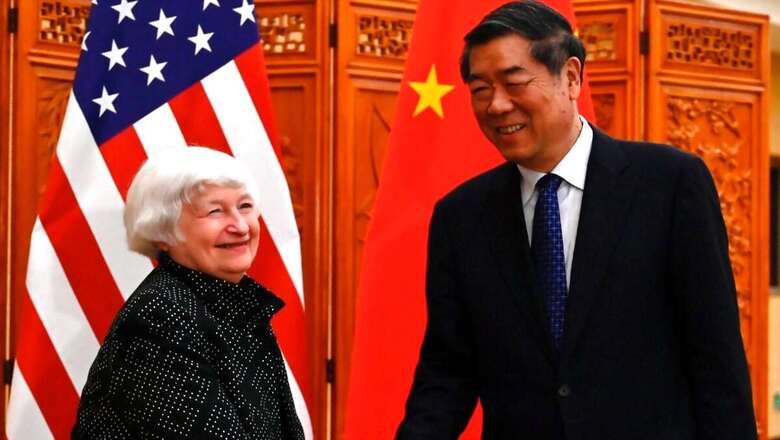
views
US Treasury chief Janet Yellen warned during a visit to China on Friday that Beijing’s subsidies for industry could pose a risk to global economic resilience.
Yellen arrived in the southern city of Guangzhou on Thursday for several days of talks with Chinese officials on her second visit to the world’s second-largest economy in less than a year.
She expressed concerns about China’s “overcapacity” undercutting American and other countries’ companies.
Such overcapacity is seen as a result of huge Chinese subsidies to industries, such as solar, electric vehicles and batteries, that risk creating a surplus of cheap goods that threatens those sectors elsewhere.
“Direct and indirect government support is currently leading to production capacity that significantly exceeds China’s domestic demand, as well as what the global market can bear,” she told a gathering of the US business community in Guangzhou on Friday.
“Overcapacity can lead to large volumes of exports at depressed prices,” she said.
“And it can lead to overconcentration of supply chains, posing a risk to global economic resilience.”
Such fears are not part of an “anti-China policy”, she said during a question-and-answer session after the speech, but are intended to mitigate risks from “inevitable global economic dislocation that will result” from no change in Chinese policies.
Yellen also told the gathering, organised by the US Chamber of Commerce in China, that she would seek to raise with Chinese officials the “challenges” faced by US businesses operating in the country.
That included Beijing “imposing barriers to access for foreign firms and taking coercive actions against American companies”, she said.
“This doesn’t only hurt these American firms: ending these unfair practices would benefit China by improving the business climate here,” Yellen said.
‘Level playing field’
Yellen then met with Vice Premier He Lifeng, seen as one of Beijing’s most powerful economic policymakers, who said he looked forward to “further in-depth discussions on important issues to China, the United States and the global economic and financial arena”.
He also said they would seek to “provide appropriate responses to key concerns in China-US economic relations”.
“It is hoped that both sides will achieve new mutually beneficial and win-win outcomes,” he added.
The two sides then began closed-door talks, which the United States has said will see the two dive deep into both countries’ economic situations as well as address more sensitive areas such as national security and Beijing’s alleged support for Russia’s defence industrial base.
Yellen in the morning told the governor of Guangdong — a vast province emblematic of the reforms and development that drove China’s breakneck growth — that the United States was committed to a “healthy economic relationship”.
But, she stressed, that required “a level playing field for American workers and firms”.
China pushback
Beijing has dismissed concerns over its vast state support for industry, last month condemning an EU probe into its subsidies for EVs as “protectionism” and part of a Western effort to politicise international trade.
Washington’s worries about a flood of exports come as US President Joe Biden pushes to boost domestic manufacturing in clean energy, with policymakers warning that China’s excess capacity could harm the growth of those industries.
The Biden administration is very sensitive to the US auto industry’s concerns about China and EVs, especially in an election year, said Paul Triolo, associate partner for China at Albright Stonebridge Group.
“It is likely that the administration will take some action to show it is willing to act pre-emptively to prevent future problems from China’s overcapacity in EVs,” he told AFP.
But he warned that Beijing would likely “react badly”, given that the impact on US automakers remains to be seen.
Yellen also plans to meet Chinese Premier Li Qiang during her trip, as well as central bank governor Pan Gongsheng and Finance Minister Lan Fo’an.
Beijing and Washington have clashed in recent years on flashpoint issues ranging from technology and trade to human rights, as well as over the self-ruled island of Taiwan and the South China Sea.
Relations have stabilised somewhat since Biden and his Chinese counterpart Xi Jinping met in San Francisco in November for talks that both sides described as a qualified success.
Yellen’s July 2023 visit helped restart dialogue after a period of heightened tensions, notably over Taiwan, and culminated in the launching of bilateral working groups on economic and financial policy.
US Secretary of State Antony Blinken is also expected to make another China trip in the coming weeks, a sign that both sides are returning to more routine engagements.


















Comments
0 comment